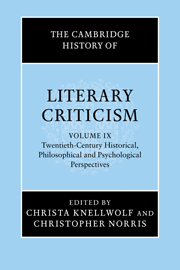Book contents
- Frontmatter
- Introduction
- HISTORY
- MARXISM AND POST-MARXISM
- FROM CULTURAL POETICS TO CULTURAL STUDIES
- PSYCHOANALYTIC APPROACHES
- GENDER AND SEXUALITY
- COLONIALISM, POST-COLONIALITY, NATION AND RACE
- MODERNITY AND POSTMODERNISM
- 21 Modernism, modernity, modernisation
- 22 Postmodernism
- PHILOSOPHY, AESTHETICS AND LITERARY CRITICISM
- INTERDISCIPLINARY APPROACHES
- Bibliography
- Index
- References
22 - Postmodernism
from MODERNITY AND POSTMODERNISM
Published online by Cambridge University Press: 28 March 2008
- Frontmatter
- Introduction
- HISTORY
- MARXISM AND POST-MARXISM
- FROM CULTURAL POETICS TO CULTURAL STUDIES
- PSYCHOANALYTIC APPROACHES
- GENDER AND SEXUALITY
- COLONIALISM, POST-COLONIALITY, NATION AND RACE
- MODERNITY AND POSTMODERNISM
- 21 Modernism, modernity, modernisation
- 22 Postmodernism
- PHILOSOPHY, AESTHETICS AND LITERARY CRITICISM
- INTERDISCIPLINARY APPROACHES
- Bibliography
- Index
- References
Summary
Where are the primary causes on which I can take my stand,
where are my foundations? Where am I to take them from?
I practise thinking, and consequently each of my primary
causes pulls along another, even more primary, in its wake,
and so on ad infinitum.
Fyodor Dostoevsky, Notes From Underground (1864)Naming the unnamable: what is postmodernism?
In 1979, Jean-François Lyotard proclaimed that Enlightened modernity was now caught in a ‘legitimation crisis’ from which it could not recover. By the mid-eighties, La condition postmoderne enjoyed hierophantic status as the book which had completed the Nietzschean project of persuading us of the death of the ‘grand narratives’ of God, metaphysics and science. Twenty years on, the discourse which named that crisis seems to have developed its own terminal symptoms. In a rather Beckettian image, Lyotard has recently declared that postmodernism is now an ‘old man's occupation, rummaging in the dustbin of finality to find remains’. Richard Rorty (defender of consensus but hardly secret sharer of Lyotard's postmodern anti-foundationalism) has also come to see the term as so elastic as to be useless even for his own neo-pragmatic purposes. He has, he now tells us, ‘given up on the attempt to find something common to Michael Graves’ buildings, Pynchon's and Rushdie's novels, Ashberry's poems, various sorts of popular music, and the writings of Heidegger and Derrida’. So, has postmodernism become a victim of that very built-in obsolescence which was central to its diagnosis of all intellectual or artistic culture within late capitalism? Is it possible any longer to define postmodernism? Perhaps the task is comparable to an attempt to force a rainbow back through the geometrical contours of Newton's prism.
Still, if we accept Fredric Jameson's belief that the value of postmodern expression lies precisely in its attempt to name the unnameable, to find a form in which to represent the seemingly unrepresentable global networks of technologised late capitalist culture, then there is some historical justification in attempting, yet again, to name the unnameable which is postmodernism.
- Type
- Chapter
- Information
- The Cambridge History of Literary Criticism , pp. 289 - 306Publisher: Cambridge University PressPrint publication year: 2001



